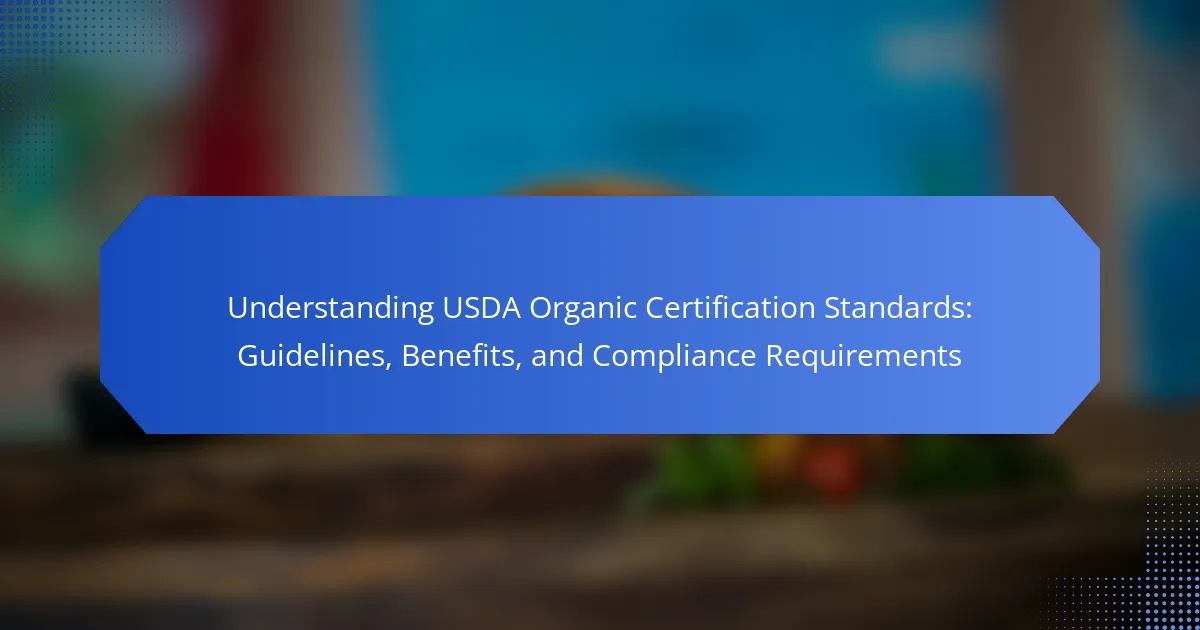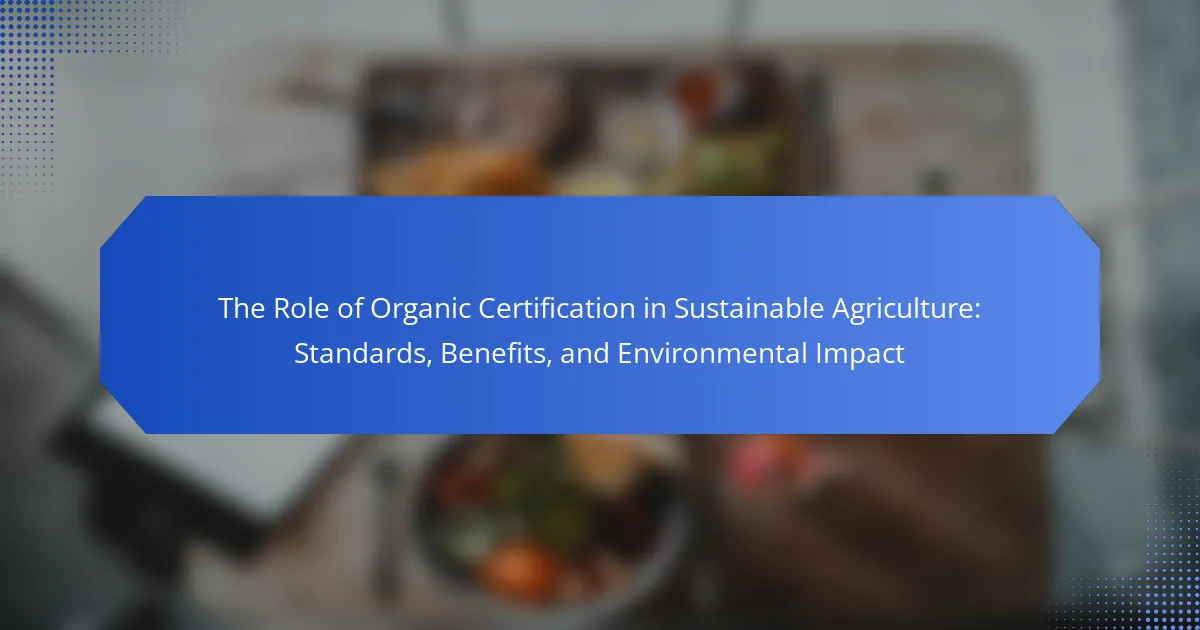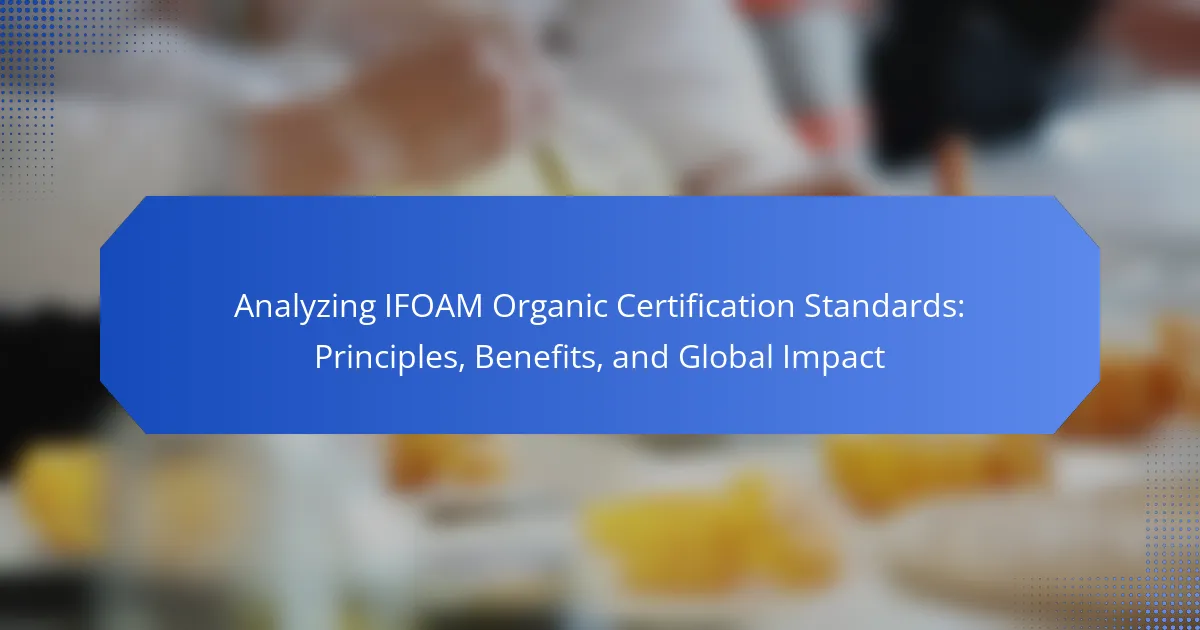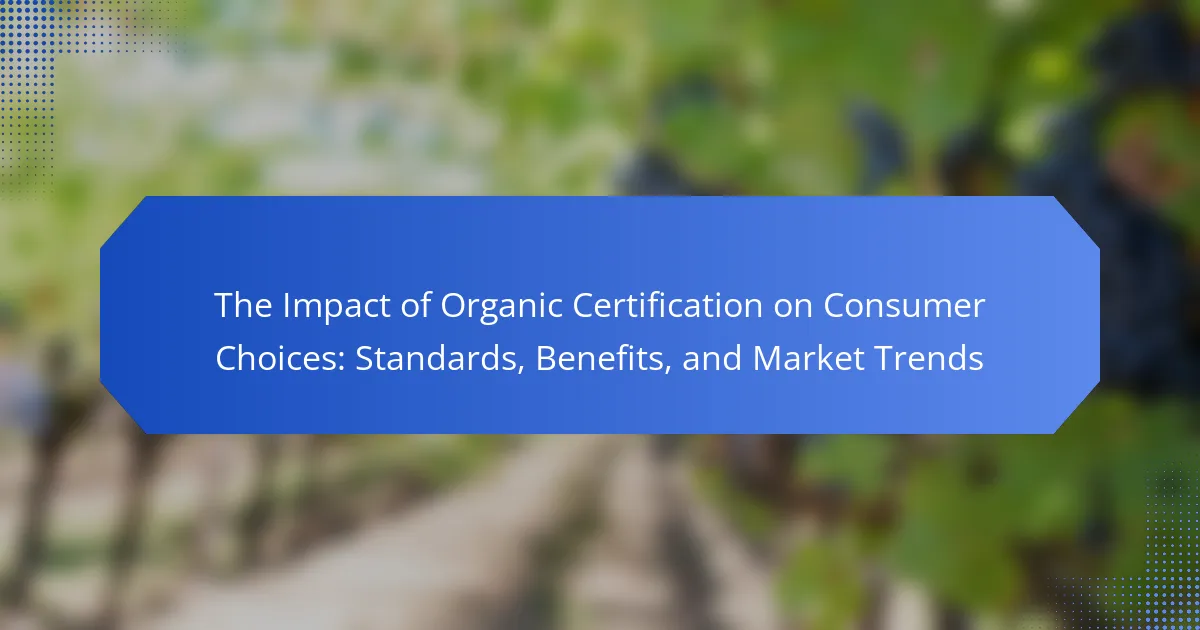JAS Organic Certification Standards are regulations established by Japan’s Ministry of Agriculture, Forestry and Fisheries to ensure that agricultural products labeled as organic meet specific criteria. These standards encompass production methods, processing, labeling, and the prohibition of synthetic pesticides and fertilizers. Compliance involves detailed record-keeping and is verified through inspections by authorized certification bodies. The article will explore the criteria for JAS certification, the benefits it provides to producers and consumers, and its international recognition, emphasizing the importance of understanding and navigating the certification process for successful compliance.
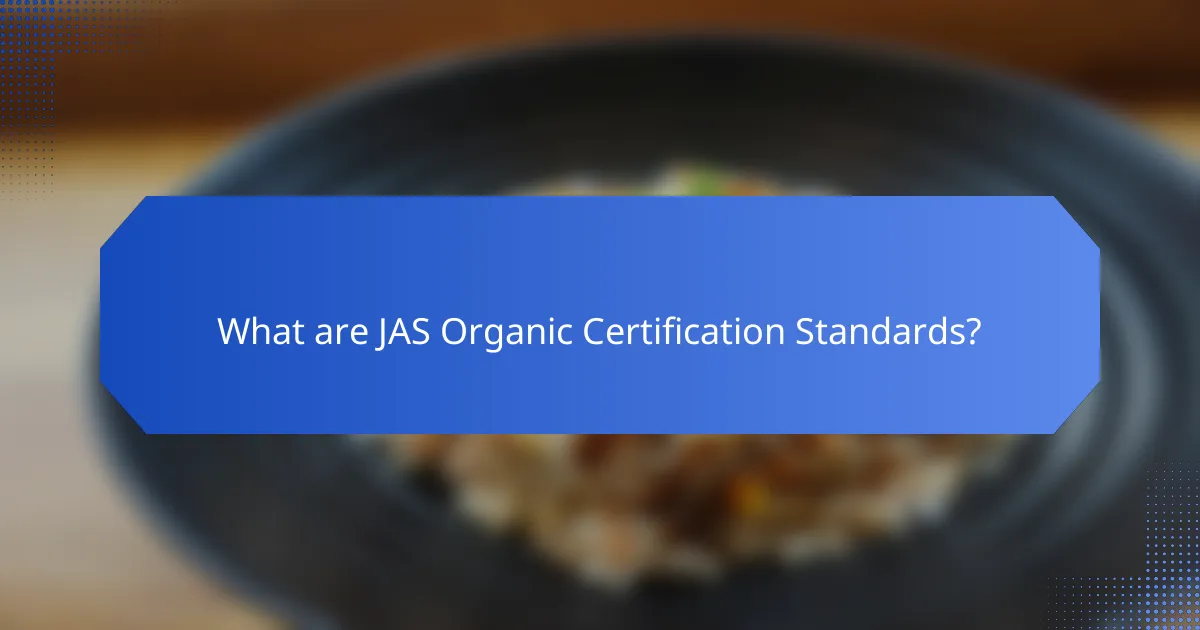
What are JAS Organic Certification Standards?
JAS Organic Certification Standards are regulations set by Japan’s Ministry of Agriculture, Forestry and Fisheries. These standards ensure that agricultural products labeled as organic meet specific criteria. The JAS standards cover various aspects, including production methods, processing, and labeling. They require the use of organic seeds and prohibit synthetic pesticides and fertilizers. Farmers must also maintain detailed records of their practices. Compliance with these standards is verified through inspections by authorized certification bodies. The JAS certification is recognized internationally, promoting trust in Japanese organic products.
How do JAS Organic Certification Standards differ from other organic certifications?
JAS Organic Certification Standards differ from other organic certifications primarily in their specific regulatory framework. JAS stands for Japan Agricultural Standards. These standards are established by the Japanese government and are unique to Japan. They require strict adherence to organic farming practices, including the prohibition of synthetic pesticides and fertilizers.
Additionally, JAS certification mandates that products must be processed and handled according to defined organic methods. This includes traceability from farm to consumer. In contrast, other organic certifications, such as USDA Organic, have different regulatory requirements and may allow certain synthetic substances under specific conditions.
Furthermore, JAS certification is recognized primarily in Japan and has specific labeling requirements that differ from those in other countries. The focus on domestic agricultural practices and consumer safety makes JAS standards distinct within the global organic certification landscape.
What unique attributes define JAS certification?
JAS certification is defined by its focus on organic agricultural practices in Japan. It mandates adherence to strict guidelines for organic farming, processing, and labeling. JAS certification ensures that products are free from synthetic pesticides and fertilizers. It also requires compliance with specific soil management practices to maintain soil health. The certification process includes rigorous inspections and documentation requirements. JAS certification is recognized internationally, enhancing market access for Japanese organic products. It promotes consumer trust through transparency and traceability in the supply chain. The certification is governed by the Japanese Ministry of Agriculture, Forestry and Fisheries, ensuring its credibility and authority.
What are the historical origins of JAS standards?
JAS standards, or Japanese Agricultural Standards, originated in Japan in the early 2000s. They were established to regulate the production and labeling of organic agricultural products. The Japanese government implemented these standards to ensure quality and promote consumer trust in organic products. JAS standards align with international organic certification practices. They support Japan’s commitment to sustainable agriculture and food safety. The development of these standards was influenced by global trends in organic farming. The JAS certification process includes strict guidelines for organic farming practices. This ensures that products labeled as organic meet specific criteria.
Why are JAS Organic Certification Standards important?
JAS Organic Certification Standards are important because they ensure the integrity of organic products. These standards provide a clear framework for organic farming practices. They promote sustainable agriculture and protect consumer health. JAS certification guarantees that products meet specific organic criteria. This builds trust between consumers and producers. Additionally, JAS standards enhance market access for Japanese organic products. They align with international organic standards, facilitating global trade. Overall, they play a crucial role in maintaining quality and credibility in the organic market.
How do these standards impact consumer trust?
JAS Organic Certification Standards significantly enhance consumer trust. These standards ensure that products meet specific organic criteria. Consumers feel more confident purchasing items labeled as JAS certified. The certification process involves rigorous inspections and compliance checks. This transparency reassures consumers about product authenticity. Research shows that 70% of consumers prefer certified organic products. Trust in certification can lead to increased brand loyalty. Brands with JAS certification often report higher sales. Overall, these standards play a crucial role in building consumer confidence in organic products.
What role do JAS standards play in promoting sustainable agriculture?
JAS standards play a crucial role in promoting sustainable agriculture by establishing guidelines for organic farming practices. These standards ensure that farming methods are environmentally friendly and socially responsible. JAS certification requires adherence to specific practices that enhance soil health and biodiversity. This includes prohibiting synthetic pesticides and fertilizers. The standards also promote crop rotation and organic waste recycling. As a result, JAS-certified farms contribute to reducing environmental degradation. Furthermore, they help consumers identify products that align with sustainable practices. This fosters a market for organic products, encouraging more farmers to adopt sustainable methods. Overall, JAS standards support the transition to more sustainable agricultural systems.
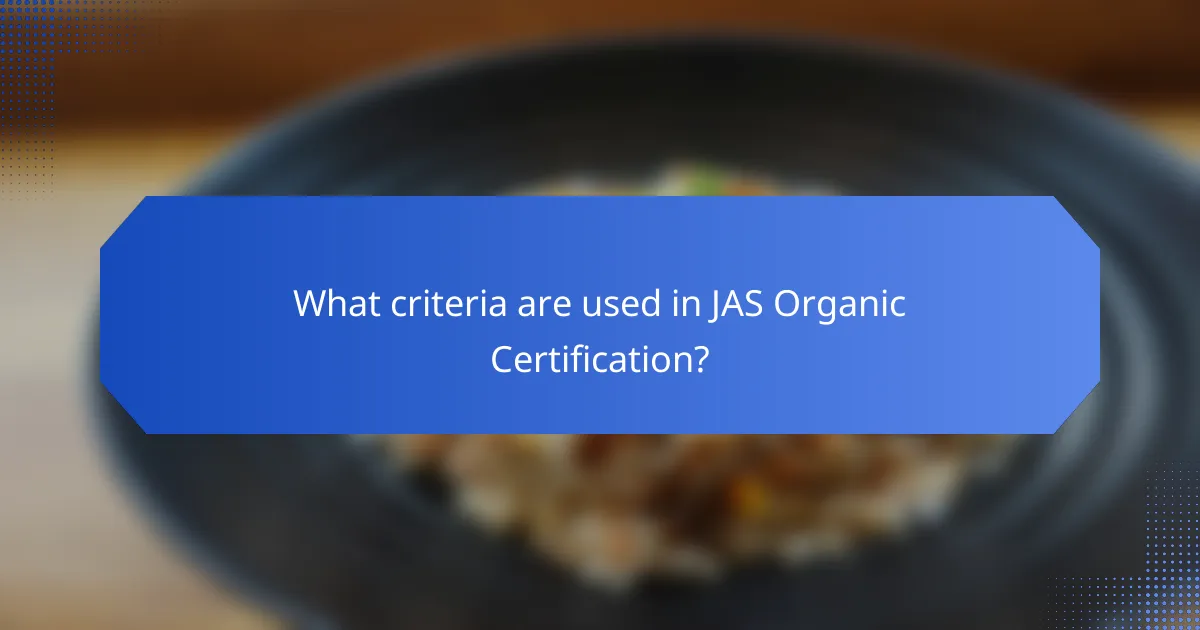
What criteria are used in JAS Organic Certification?
JAS Organic Certification criteria include compliance with organic farming practices, traceability, and proper labeling. Organic farming practices require the use of natural substances and methods. These practices prohibit synthetic pesticides and fertilizers. Traceability ensures that organic products can be tracked from farm to market. Proper labeling involves clear identification of organic products to prevent consumer confusion. Additionally, the certification process includes annual inspections and documentation reviews. These inspections verify adherence to the established organic standards. Compliance with JAS standards aligns with international organic regulations.
What are the key requirements for obtaining JAS certification?
To obtain JAS certification, an entity must comply with specific organic standards set by the Japanese government. These standards include adherence to organic farming practices, which prohibit the use of synthetic pesticides and fertilizers. The entity must also undergo a thorough inspection process by an accredited certification body. This inspection evaluates compliance with JAS organic standards. Additionally, the entity must maintain detailed records of farming practices and inputs used. The certification process requires a commitment to continuous improvement and adherence to organic principles. Entities must also undergo annual audits to maintain their certification status.
How does soil management factor into JAS standards?
Soil management is a crucial component of JAS standards. JAS, or Japanese Agricultural Standards, emphasizes sustainable agricultural practices. Effective soil management ensures soil health and fertility. This is vital for organic farming under JAS. The standards require practices that enhance soil structure and biodiversity. Crop rotation, cover cropping, and composting are recommended techniques. These practices prevent soil degradation and promote nutrient cycling. Compliance with JAS standards involves regular soil testing and monitoring. This ensures that soil management practices align with organic certification requirements.
What are the regulations regarding pesticide use under JAS certification?
JAS certification regulations prohibit the use of synthetic pesticides in organic farming. Farmers must adhere to strict guidelines that promote natural pest control methods. The Japanese Agricultural Standards (JAS) specify acceptable substances for pest management. Organic producers can only use pesticides derived from natural sources. These regulations ensure the safety and integrity of organic products. Compliance is verified through regular inspections and documentation. Violations can result in loss of certification. Overall, JAS certification promotes sustainable agricultural practices while protecting consumer health.
What processes are involved in the certification journey?
The certification journey involves several key processes. First, applicants must prepare documentation that details their farming practices and compliance with organic standards. Next, an application is submitted to a certifying body for review. After the review, an on-site inspection is conducted to verify adherence to standards. The inspector evaluates practices and records against the established criteria. Following the inspection, a report is generated, which is reviewed by the certifying body. If the applicant meets all requirements, certification is granted. This process typically takes several months and may include additional follow-up inspections.
How long does the certification process typically take?
The certification process typically takes between six months to one year. This duration can vary based on several factors. These factors include the complexity of the operation and the preparedness of the applicant. Organizations must submit detailed documentation for review. Additionally, on-site inspections are required, which can also influence the timeline. According to the Japan Agricultural Standards (JAS), thorough preparation can expedite the process. Thus, a well-organized application may lead to quicker certification.
What documentation is required for JAS certification?
JAS certification requires specific documentation to verify compliance with organic standards. Key documents include an organic management plan outlining farming practices. Additionally, records of inputs used, such as fertilizers and pesticides, are necessary. Certification bodies also require evidence of traceability for organic products. This includes purchase invoices and sales records. Inspection reports from accredited certifying organizations are essential as well. All documentation must demonstrate adherence to JAS regulations. These requirements ensure transparency and integrity in the organic certification process.
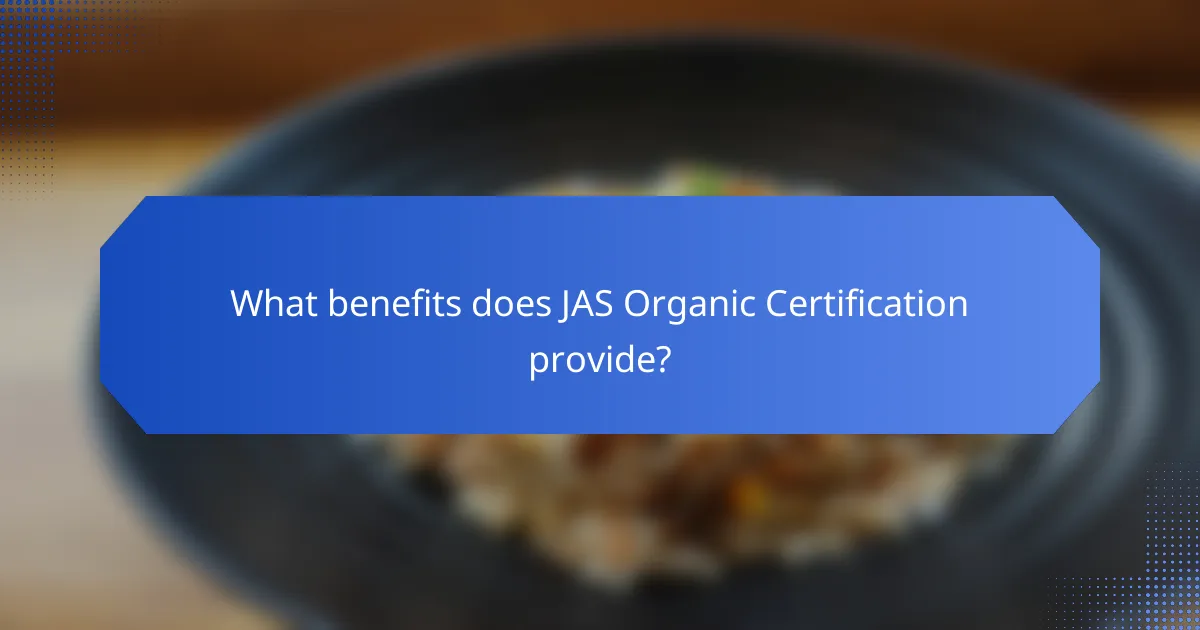
What benefits does JAS Organic Certification provide?
JAS Organic Certification provides several benefits for producers and consumers. It ensures that products meet strict organic standards, promoting environmentally friendly agricultural practices. This certification enhances market access for organic products, particularly in Japan. It also builds consumer trust, as JAS certification is recognized for its rigorous quality assurance. Additionally, certified products often command higher prices, benefiting farmers economically. The certification can lead to improved soil health and biodiversity, as it encourages sustainable farming methods. Overall, JAS Organic Certification supports both economic and environmental goals in agriculture.
How does JAS certification enhance marketability for producers?
JAS certification enhances marketability for producers by validating their organic practices. This recognition appeals to consumers who prioritize organic products. It assures buyers of product quality and compliance with strict standards. Increased consumer trust can lead to higher sales. JAS certification also opens access to international markets. Many countries require certification for organic imports. Producers can differentiate themselves from non-certified competitors. This competitive edge can result in better pricing and market positioning.
What are the economic advantages for certified organic farmers?
Certified organic farmers enjoy several economic advantages. They typically receive higher prices for their products. A study by the USDA found that organic crops can sell for 20% to 100% more than conventional crops. This price premium significantly boosts their profit margins. Additionally, certified organic farmers often have access to niche markets. These markets are increasingly popular among health-conscious consumers.
Organic farming can also lead to reduced input costs over time. Healthier soil and ecosystems can reduce the need for synthetic fertilizers and pesticides. This can lower overall production costs. Moreover, certified organic farms may qualify for government subsidies and grants. Such financial support can further enhance their economic viability.
Furthermore, organic certification can improve brand loyalty and consumer trust. Many consumers are willing to pay more for products they perceive as environmentally friendly and sustainable. This consumer behavior can lead to increased sales and market share for certified organic farmers.
How does JAS certification influence consumer purchasing decisions?
JAS certification influences consumer purchasing decisions by providing assurance of organic standards. Consumers often prefer products with certifications, as they indicate quality and trustworthiness. Studies show that consumers are willing to pay a premium for certified organic products. This is because JAS certification signifies adherence to strict agricultural practices. Additionally, consumers associate JAS certification with environmental sustainability. The recognition of JAS certification in international markets boosts consumer confidence. As a result, products with JAS certification often experience increased demand. This trend is supported by market research indicating higher sales for certified organic goods.
What global recognition does JAS Organic Certification hold?
JAS Organic Certification is recognized globally as a standard for organic agricultural products. It is endorsed by the Japanese Ministry of Agriculture, Forestry and Fisheries. This certification assures consumers that products meet strict organic farming practices. JAS certification is accepted in various international markets. It aligns with standards set by the International Federation of Organic Agriculture Movements (IFOAM). Many countries acknowledge JAS certification as equivalent to their own organic standards. This recognition facilitates trade and consumer confidence in organic products.
How is JAS certification perceived in international markets?
JAS certification is perceived positively in international markets. It signifies compliance with Japan’s strict organic standards. This certification enhances the credibility of organic products abroad. Many countries recognize JAS as a mark of quality. It facilitates access to the Japanese market for foreign producers. JAS certification can increase consumer trust in organic products. Studies show that certified products often command higher prices. Overall, JAS certification supports global trade in organic goods.
What partnerships exist between JAS and other organic certification bodies?
JAS has partnerships with various organic certification bodies to enhance its credibility and recognition. Notably, JAS collaborates with the USDA National Organic Program. This partnership facilitates mutual recognition of organic standards. Additionally, JAS works with the EU’s organic certification system. This collaboration allows for easier market access for certified products. These partnerships ensure that JAS-certified products meet international organic standards. They also promote the global acceptance of Japanese organic products.
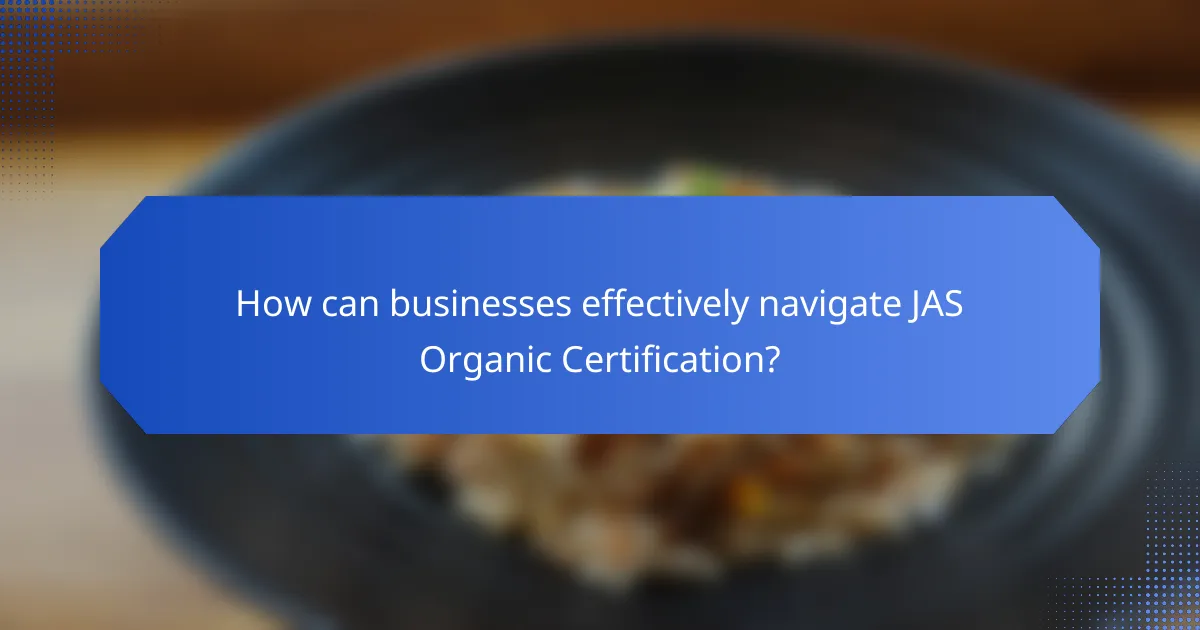
How can businesses effectively navigate JAS Organic Certification?
Businesses can effectively navigate JAS Organic Certification by understanding the specific requirements and processes involved. They should start by familiarizing themselves with the JAS standards set by the Japanese Ministry of Agriculture, Forestry and Fisheries. This includes knowing the regulations regarding organic farming practices and product handling.
Next, businesses must ensure that their operations comply with these standards. They can achieve this by implementing organic practices throughout their supply chain. Documentation of compliance is essential, as businesses need to maintain records of their organic practices for inspection purposes.
Engaging with a registered certification body is crucial. These organizations provide guidance and conduct the certification process. Businesses should prepare for audits by these bodies, which assess compliance with JAS standards.
Additionally, ongoing education and training for staff can enhance understanding of organic practices. This ensures all employees are aware of the standards and contribute to maintaining compliance.
Finally, businesses should stay updated on any changes in regulations or standards. This proactive approach helps maintain certification and ensures continued market access.
What best practices should businesses follow when seeking JAS certification?
Businesses seeking JAS certification should implement a comprehensive approach to ensure compliance. First, they must understand the JAS standards thoroughly. This includes familiarizing themselves with specific requirements for organic products. Next, businesses should conduct a gap analysis to identify areas needing improvement. Documenting all processes and practices is essential for transparency and traceability.
Training staff on organic practices and JAS requirements enhances compliance. Regular internal audits help maintain standards and readiness for external assessments. Engaging with a certified JAS auditor can provide valuable insights and guidance. Finally, businesses should stay updated on any changes to JAS regulations to ensure ongoing compliance.
How can businesses prepare for the certification audit?
Businesses can prepare for the certification audit by conducting a thorough internal review. This review should assess compliance with JAS Organic Certification Standards. Companies need to ensure all documentation is complete and accurate. Training staff on relevant standards is essential for successful audits. Implementing corrective actions for any identified non-conformities is necessary. Regularly updating procedures to align with certification requirements is beneficial. Engaging a third-party consultant for guidance can enhance readiness. According to the Japan Agricultural Standards (JAS), proper preparation significantly increases the likelihood of successful certification.
What common challenges do businesses face during the certification process?
Businesses commonly face challenges such as understanding complex requirements during the certification process. Certification standards can vary significantly, leading to confusion. Documentation and record-keeping are often extensive and time-consuming. Many businesses struggle with the financial costs associated with certification. Training staff to comply with standards can also be a hurdle. Additionally, maintaining compliance over time requires ongoing effort. Many businesses find it difficult to adapt their operations to meet evolving standards. These challenges can delay the certification process and impact overall business operations.
JAS Organic Certification Standards are regulations established by Japan’s Ministry of Agriculture, Forestry and Fisheries to ensure that agricultural products labeled as organic meet specific criteria. This article explores the unique attributes of JAS certification, its differences from other organic certifications, and the criteria required for obtaining it. Additionally, it discusses the benefits of JAS certification for producers and consumers, its role in promoting sustainable agriculture, and its global recognition in the organic market. The article also outlines best practices for businesses navigating the certification process and the common challenges they may face.
